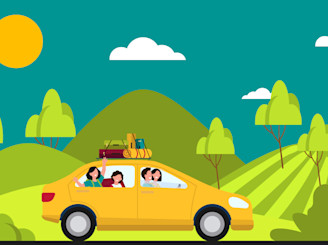How do you get to France (and therefore to Nouvelle-Aquitaine) when you're a foreign citizen? Here you'll find out all you need to know about visas, getting through customs and duty-free purchases.
A visa to enter France
How to get a visa?
You're a foreign citizen and you'd like to come to France? When you come through customs you'll need to be able to present the regulatory documents relative to your stay, means of subsistence and accommodation.
Unless you're from the Schengen Area or exempted, you'll need a visa to enter France. Before you leave, you should request one from the French Embassy or Consulate in your country of residence. The type of visa required to enter France depends on both the length and purpose of your anticipated stay:
-
For visits of up to 90 days (3 months), the visa required is a "Schengen Visa». This is issued for one or multiple entries generally for tourism, business trips or family visits. It also enables the holder to come to France for short training courses, internships or for paid activity (artists touring abroad, athletes participating in sports championships, employees detached for a specific mission, etc...).
-
For visits over 90 days (3 months), the visa to apply for is a long-stay visa adapted to the length and purpose of the stay. Once you're in France, you'll need to register with the French Office for Immigration and Integration (OFII) or, depending on your circumstances, with the relevant Prefecture for an authorised residents permit. Once on French soil, the visa holder will not be able to change either his visa or his status.
-
Transit through a French airport without leaving the "international" zone is a case apart, as the person does not enter French territory and therefore does not need an entry-visa, subject to exceptions.
Visa waivers European regulation delivers a certain number of short-stay visa nationalities to enter the Schengen zone. Under European Union Law specific provisions exist for the following individuals:
-
Citizens of European Union member states (UE), the European Economic Area (EEA) or Switzerland are not subject to visa or resident permits, however long their stay;
-
Family members of European member states, EEA or Swiss citizens (spouse, minor or dependent children, dependent ascendants) are subject to the same rules of movement as other foreigners of the same nationality.
French customs
At the French border there are two distinct customs lanes, depending on the type and quantity of your goods: the "green" lane where you have nothing to declare and the "red" lane if you have goods to declare.
Whether arriving or departing from France, you need to declare money, stocks or securities that you're carrying with you if they have a value superior to 10.000€ (or equivalent in cash). This declaration is free and can be done on line through the customs service.
For information on prohibited goods (drugs, counterfeits, threatened or vulnerable animal or plant species) or those subject to restrictions (weapons, medicine...), and for advice on how to declare your valuables and recognise counterfeits: go to the French customs website. If you fail to get informed, goods may be confiscated by Customs and you could be subject to a fine.
Customs Services Information (outside continental France or abroad) :
+33.1.72.40.78.50
ids@douane.finances.gouv.fr
Duty-free shopping
Visitors resident outside the European Union are entitled to a tax deduction on purchases over a certain amount.
If you are over 16 and resident outside the European Union, you are allowed to deduct VAT (Value Added Tax), whatever your nationality. To benefit from this reduction an identity card will be required during your purchases.
This deduction is applicable for tourism and non-commercial purchases, for amounts superior to 175€ TTC (including tax), spent on the same day in the same place. Some goods are excluded from tax-free benefits (services, cultural goods, weapons...).
In practice, either the tax deduction is taken off at the time of purchase, or it may be subject to reimbursement at a later date. In the latter case, the retailer delivers a tax refund slip to be presented to customs on leaving the country.
A simplified electronic visa of the export sales form (PABLO) will allow you to avoid long queues at duty-free tax counters, thanks to multi-lingual electronic terminals, especially in airports.





